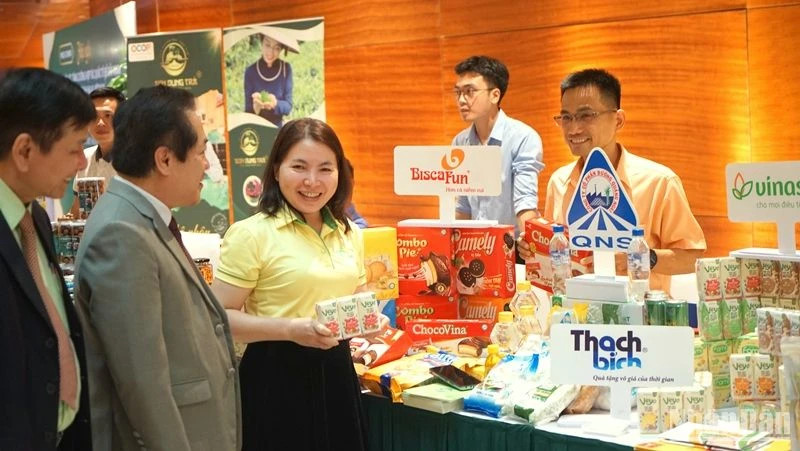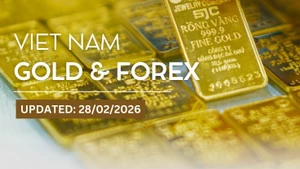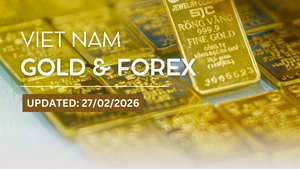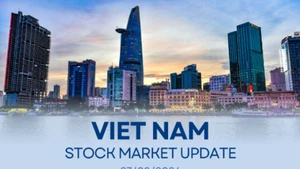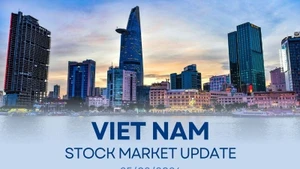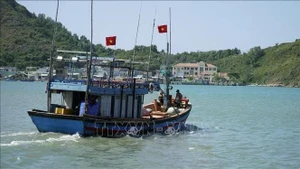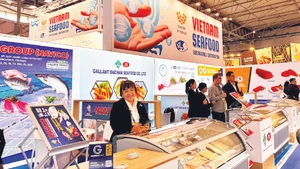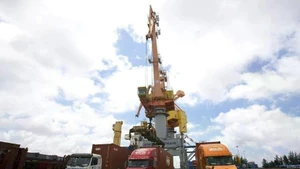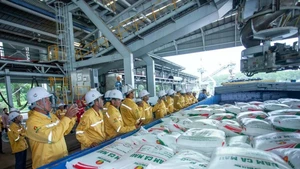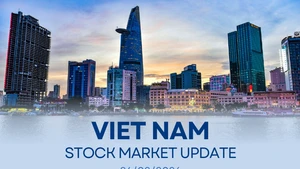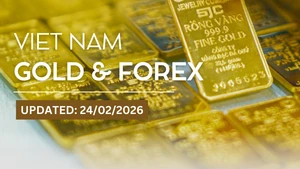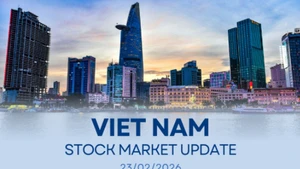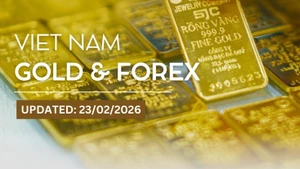Great opportunity for Vietnam's Halal industry
On the morning of April 4, the Ministry of Industry and Trade held a trade promotion conference in Hanoi with the Vietnamese trade offices abroad with the theme "Trade promotion to enhance the exploitation of the global Halal product market".
The conference was held both in person and online under the chairmanship of Deputy Minister of Industry and Trade Nguyen Sinh Nhat Tan with the participation of representatives of associations, industries, localities, businesses, and units under the Ministry of Industry and Trade and the Vietnam Trade Offices abroad.
At the conference, Deputy Minister Nguyen Sinh Nhat Tan emphasised that the global Halal market, worth 2 trillion USD, opens up great opportunities for Vietnam's export goods. Therefore, this market needs to be focused on and conquered.
"With the total market worth 2 trillion USD, we only need to occupy a 10% market share, which brings great value. If we strive in five years with the current growth rate, Vietnam's exports can occupy a high proportion of the global Halal market", said the Deputy Minister.
Introducing the potential and opportunities for Halal product development in Vietnam and the world, Ramlan Bin Osman, Director of the National Halal Certification Centre (HALCERT) under the Ministry of Science and Technology said that Vietnam has a great opportunity to participate in the global Halal food market, worth 2 trillion USD but has not been fully met, with less than 10% of demand satisfied.
Accordingly, Vietnam has abundant raw materials for the Halal industry, including coffee, rice, seafood, aquaculture products, spices, nuts, vegetables and fruits, showing great potential in producing final products.
According to Bin Osman, Vietnam has also been recognised as one of the leading international tourist destinations, showing strong development potential in the accommodation service industry, including Halal restaurants and catering services.
Affirming that the Halal market has received great attention from associations and industries, Tran Van Hiep, Vice President of the Vietnam Cashew Association, said that in 2024, the cashew industry exported 700,000 tons of cashew nuts, worth 3.8 billion USD, in which Halal certification as well as other certifications on management and quality control are very important.
According to Hiep, in recent years, the association has focused on the Halal market when all exported cashew products have Halal certification as well as other certifications on quality. The largest market is still the US, with the highest requirement for Halal certification, accounting for 30% of total export output, followed by Europe, Australia and Middle Eastern countries.
Sharing challenges and barriers that businesses face when entering the Halal market, Le Phu Cuong, Head of the Vietnam Trade Office in Malaysia, affirmed that the demand for Halal products of the Muslim community is very large, however, achieving Halal certification standards for export is another issue.
According to Cuong, Halal certification is not a mandatory requirement for imported goods into Malaysia, however, many importers, distributors, and retailers prioritise choosing products with this certificate to meet the majority of local consumers, as the Muslim population in this country accounts for 60%, so most of the prioritised products must have Halal certification.
 |
| Overview of the conference (Photo: NDO) |
Indonesia is a country with a large import demand for Halal products. Pham The Cuong, Counselor of the Vietnam Trade Office in Indonesia, informed that Indonesia's Halal certification is also considered a non-tariff barrier, when the licence granting procedures and time prolong with high cost and short validity, causing difficulties for small- and medium-sized enterprises.
Meanwhile, the number of units authorised by Indonesia to issue certification is limited to only one unit and is only applied to food. The certification process is quite complicated, food safety and hygiene requirements are maintained throughout the supply chain, not just input. Besides, businesses’ interest in Halal licensing processes is still limited, lacking in systems, along with competition from other countries.
Developing a comprehensive Halal ecosystem
With its potential and open opportunities, the Halal market is becoming an important direction for Vietnamese businesses in their export expansion strategy. However, to make the most of this advantage, there needs to be close coordination between the government, businesses and certification organisations to build a systematic Halal ecosystem that meets international standards.
Affirming that this is a market that needs to be focused on and conquered, Deputy Minister of Industry and Trade Nguyen Sinh Nhat Tan said that in the context of the world economy with many unpredictable uncertainties, penetrating and affirming Vietnamese Halal products brand is an important requirement to diversify the market.
The Deputy Minister requested to link up networks and start building a project to promote Vietnamese products in Halal markets, with clear and specific goals.
In addition, it is necessary to promptly connect businesses with Halal certification organisations and trade offices to bring Vietnamese products to traditional destinations as well as new markets, contributing to diversifying Halal products.
Tran Trong Kim, Counselor of the Vietnam Trade Office in Saudi Arabia suggested that state management agencies and localities need to have guidelines on procedures and processes for Halal certification recognition, supporting to promote cooperation in signing mutual recognition of Halal, because many countries have not yet directly recognised businesses’ products but still have to go through a third party.
Moreover, it is necessary to increase foreign investment attraction and build international standard Halal facilities. Businesses also need to research and invest in production lines meeting Halal standards and approach enterprises and organisations recognised for Halal certification for reference and advice.
In addition, businesses also need to actively participate in activities promoting Vietnam's Halal food, such as specialised fairs, focusing on high-quality Halal products, avoiding trade disputes through verification, checking partners before trading and signing irrevocable contracts and having deposits in advance to ensure safety.
Emphasising that Vietnam currently does not have many human resources with knowledge of the Halal market, Truong Xuan Trung, who is in charge of the Vietnam Trade Office in the United Arab Emirates (UAE), suggested that it is necessary to further improve the legal system on Halal, in which the Vietnam-UAE Comprehensive Economic Partnership Agreement (CEPA) that has just been signed is expected to contribute to promoting trade between the two countries.
In addition, it is necessary to strengthen cooperation with Muslim countries on Halal certification, supporting and promoting more businesses with Halal certificates to export to this potential market.
